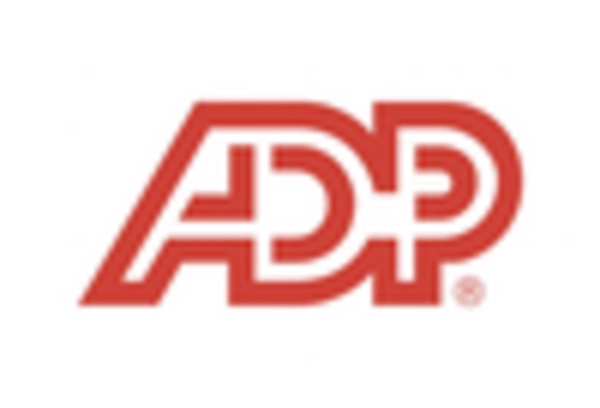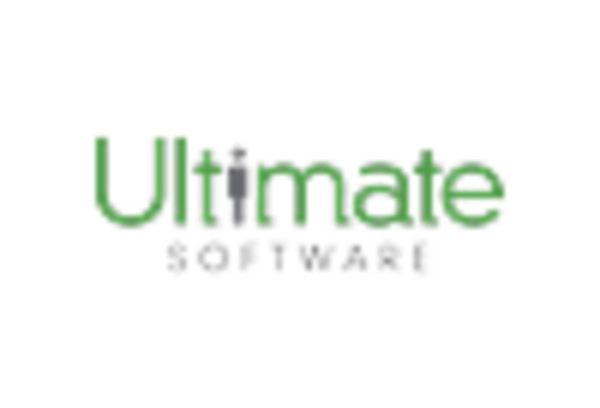Integration of Advanced Analytics
The human capital-management-software market in Germany is being propelled by the integration of advanced analytics capabilities. Organizations are increasingly leveraging data-driven insights to inform HR decisions, optimize workforce planning, and enhance employee performance. The ability to analyze employee data allows companies to identify trends, forecast future workforce needs, and implement targeted development programs. This analytical approach is expected to become a cornerstone of human capital management, as firms seek to improve operational efficiency and employee satisfaction. As a result, software solutions that offer robust analytics features are likely to gain traction in the market, catering to the growing demand for data-informed HR practices.
Shift Towards Remote Work Solutions
The human capital-management-software market in Germany is experiencing a notable shift due to the increasing prevalence of remote work arrangements. As organizations adapt to flexible work environments, there is a growing need for software that facilitates remote employee management, performance tracking, and collaboration. This trend is reflected in the rising adoption of cloud-based human capital-management solutions, which enable seamless access to HR tools from various locations. According to recent data, approximately 30% of German companies have reported an increase in remote work capabilities, thereby driving the demand for innovative software solutions. This shift not only enhances employee engagement but also necessitates the integration of advanced features within human capital-management software to support remote workforce dynamics.
Focus on Talent Acquisition and Retention
In the competitive landscape of the human capital-management-software market, the emphasis on talent acquisition and retention is becoming increasingly pronounced in Germany. Organizations are recognizing the importance of attracting and retaining skilled employees, which is driving the demand for sophisticated recruitment and onboarding solutions. The market is witnessing a surge in software that incorporates advanced analytics to identify top talent and streamline hiring processes. Recent statistics indicate that companies investing in effective talent management strategies can reduce turnover rates by up to 25%. This focus on human capital management is likely to foster innovation within the software market, as providers develop tools that enhance the overall employee experience and support long-term retention strategies.
Regulatory Compliance and Data Protection
The human capital-management-software market in Germany is significantly influenced by stringent regulatory frameworks, particularly concerning data protection and employee privacy. The General Data Protection Regulation (GDPR) mandates that organizations implement robust data handling practices, which drives the demand for software solutions that ensure compliance. Companies are increasingly seeking human capital-management-software that not only streamlines HR processes but also adheres to these regulations. This compliance requirement is expected to propel the market, as organizations invest in systems that mitigate risks associated with data breaches. Furthermore, the emphasis on transparency in employee data management is likely to enhance the market's growth, as firms prioritize solutions that offer secure and compliant data handling capabilities.
Emphasis on Employee Training and Development
The human capital-management-software market in Germany is witnessing a heightened focus on employee training and development initiatives. Organizations are increasingly recognizing the value of continuous learning and skill enhancement as a means to drive productivity and innovation. This trend is reflected in the growing demand for software solutions that facilitate training program management, performance assessments, and personalized learning paths. Recent surveys indicate that companies investing in employee development see a 20% increase in overall performance. Consequently, the human capital-management-software market is likely to expand as organizations prioritize tools that support comprehensive training and development strategies, ultimately fostering a more skilled and adaptable workforce.
















